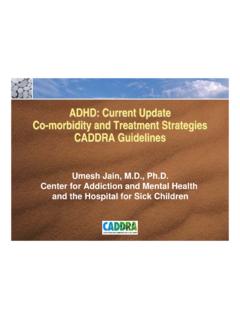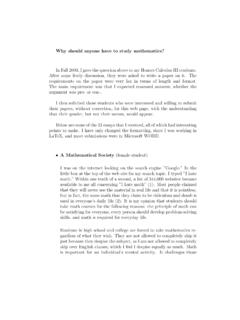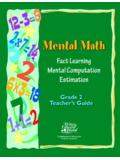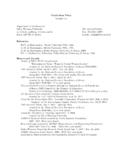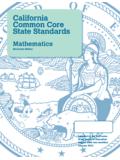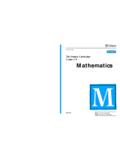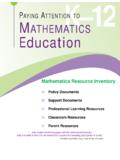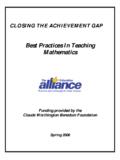Transcription of ADHD and Math Disablities - TeachADHD
1 adhd and math Disabilities: Cognitive Similarities and Instructional Interventions By Amy Platt ABSTRACT: Studies indicate that between 4-7% of the school age population experiences some form of math difficulty (Fuchs & Compton, 2005). 26% of children with adhd have a specific math disability (Mayes & Calhoun, 2006). Children with adhd have been found to have weaknesses with their working memory leading to difficulty with problems involving the manipulation of verbal and non-verbal information (Martinussen & Tannock, 2006). Recent research has looked at the connection between working memory weakness and math difficulty, specifically, arithmetic, algorithm knowledge and problem solving.
2 Swanson and Beebe-Fraser (2004) found that working memory weaknesses contributed to difficulty in mathematical word problem solving beyond that of phonological processing alone. However, working memory is not the only cognitive factor that has been correlated with math disabilities and adhd . Attention is a significant predictor of poor arithmetic, algorithms and mathematical problem solving skills. In particular, the inability to block out extraneous stimulus from working memory is significant. Research has focused on a variety of interventions in an attempt to find a way to best instruct children with adhd and math disabilities.
3 Tutoring, computer reinforcement, focused instruction and the use of stimulant medication are four methods that can work to assist children in increasing their academic achievement. What is a math Disability? Numbers are everywhere. math skills are needed for daily functioning in today s society. Health, transportation, money and food preparation are examples of math skills being intrinsic to our daily routines. However, the development of math skills is not easy for all children. Some children have difficulty developing a number sense early on in their cognitive development. In this case, children seem to take longer to differentiate between the values of two numbers and they continue to use immature counting skills, such as finger counting, well into their school years (Gersten, Jordan & Flojo, 2005).
4 In addition to difficulty with number sense, some children have difficulty mastering the basic addition, subtraction, multiplication and division facts. Their retrieval of these math facts for other uses is slower than that of their normally developing peers (Swanson & Beebe-Frankenberger, 2004). There is not yet a standard definition of math disabilities, however number sense and fact fluency are measures that are often used to help assess the degree of mathematical difficulty a child is experiencing. Studies indicate that between 4-7% of the school age population experiences some form of math difficulty (Fuchs et al., 2005). math Disabilities and adhd Children with Attention Deficit Hyperactivity Disorder ( adhd ) often experience academic difficulties.
5 One study indicates that 71% of children with adhd also have a learning disability (LD) (Mayes & Calhoun, 2006). This same study breaks down LD into subtypes and indicates that 26% of children with adhd have a specific math disability. This finding suggests that a deeper understanding of the relationship between adhd and math disabilities must be established. There are different ways to look at the relationship that exists between adhd and math disabilities. One way is to examine the behaviour implications that adhd has on classroom learning. Perhaps, children with adhd are not able to process the instructional language in the classroom and therefore fall behind in math .
6 This explanation has some merit; however it does not seem to account for the entirety of the issue. Another explanation that has been discussed recently in the research is the role that working memory, executive function and inattention play. Different research studies are trying to tease apart these different cognitive components to develop a theory about why adhd and math disabilities are so closely related (Swanson & Beebe-Frankenberger, 2004, Fuchs et al., 2005, Fuchs et al., 2006). Does it all add up to Working Memory? Working memory is an executive function. This means it is used to help make momentary decisions as well as longer term plans. Working memory is the area in which phonological or visual information is temporarily stored for the purpose of processing and manipulating information (Swanson & Beebe-Frankenberger, 2004, Martinussen & Tannock, 2006).
7 Children with adhd have been found to have weaknesses with their working memory. This leads to difficulty with problems involving the manipulation of verbal and non-verbal information (Martinussen & Tannock, 2006). Recent research has looked at the connection between working memory weakness and math difficulty, specifically, arithmetic, algorithm knowledge and problem solving. Swanson and Beebe-Fraser (2004) found that working memory weaknesses contributed to difficulty in mathematical word problem solving beyond that of phonological processing alone. This provided support for a theory that executive function contributed significantly to solving mathematical word problems.
8 Even when phonological processing, inhibition and math and reading skills were taken out of the statistical equation, a significant relationship still existed between mathematical problem solving and working memory (Swanson & Beebe-Frankenberger, 2004). However working memory is not the only cognitive factor that has been correlated with math disabilities and adhd . Attention difficulty is highly correlated with adhd and has also been seen to contribute significantly to math disabilities (Martinussen & Tannock, 2006, Fuchs et al. 2006). In another study, Fuchs (2006) looked at the cognitive correlates of Grade Three students in various mathematical areas. Unlike Swanson and Beebe-Fraser (2004) they found that working memory was not a significant cognitive correlate of arithmetic, algorithmic computation and problem solving.
9 Attention, rather than working memory, was a significant predictor of arithmetic, algorithms and mathematical problem solving. In particular, the inability to block out extraneous stimulus from working memory seemed to be significant. Fuchs et al. (2006) suggested that working memory has appeared to be a critical factor in mathematical difficulties in previous studies because other studies had not looked at the role of multiple abilities in mathematics functioning. They did acknowledge the work of Swanson and Beebe-Fraser (2004), but suggested that they may have found differences with respect to working memory because of the different ways it was defined and measured. Despite the current discrepancy in the research, there is strong evidence to suggest that working memory and inattention both play a role in mathematical difficulties in children.
10 These two cognitive factors are also cognitive correlates of adhd . Perhaps the common cognitive weaknesses in children with adhd and math difficulties accounts for the high number of children with adhd who also experience math difficulties. If adhd and math performance require the same cognitive structures to be operating efficiently, then it is no surprise that when a weakness is seen within the cognitive structure both problems emerge. Best Practice in Classroom Instruction Working with children with exceptional learning styles is a challenge for teachers. Children with adhd and math disabilities require special instruction in order to experience success. Research has focused on a variety of interventions in an attempt to find a way to best instruct children with adhd and math disabilities.
